高中英语教案万能模板
高中英语教案模板(通用8篇)
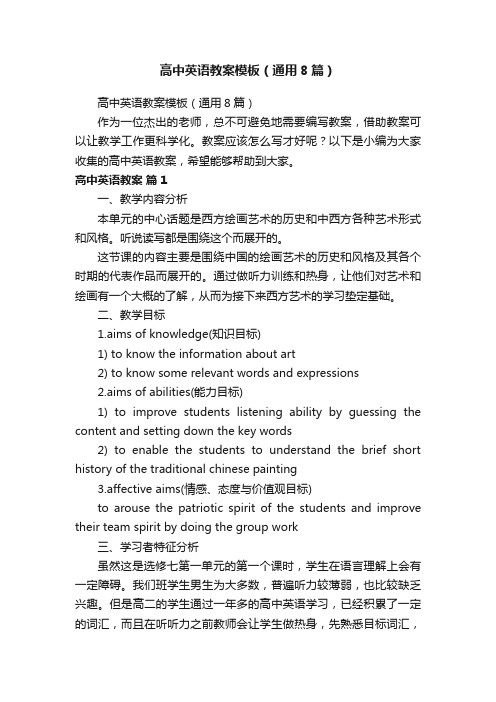
高中英语教案模板(通用8篇)高中英语教案模板(通用8篇)作为一位杰出的老师,总不可避免地需要编写教案,借助教案可以让教学工作更科学化。
教案应该怎么写才好呢?以下是小编为大家收集的高中英语教案,希望能够帮助到大家。
高中英语教案篇1一、教学内容分析本单元的中心话题是西方绘画艺术的历史和中西方各种艺术形式和风格。
听说读写都是围绕这个而展开的。
这节课的内容主要是围绕中国的绘画艺术的历史和风格及其各个时期的代表作品而展开的。
通过做听力训练和热身,让他们对艺术和绘画有一个大概的了解,从而为接下来西方艺术的学习垫定基础。
二、教学目标1.aims of knowledge(知识目标)1) to know the information about art2) to know some relevant words and expressions2.aims of abilities(能力目标)1) to improve students listening ability by guessing the content and setting down the key words2) to enable the students to understand the brief short history of the traditional chinese painting3.affective aims(情感、态度与价值观目标)to arouse the patriotic spirit of the students and improve their team spirit by doing the group work三、学习者特征分析虽然这是选修七第一单元的第一个课时,学生在语言理解上会有一定障碍。
我们班学生男生为大多数,普遍听力较薄弱,也比较缺乏兴趣。
但是高二的学生通过一年多的高中英语学习,已经积累了一定的词汇,而且在听听力之前教师会让学生做热身,先熟悉目标词汇,使听力难度降低。
高中教案英语(精选6篇)

高中教案英语(精选6篇)高中教案英语篇1Disneyland教学目标本单元对话课复习了有关问路及应答用语,要求学生用所学语言自编对话描述所在学校、区域或城市;本单元介绍了美国的迪斯尼乐园及其创始人Walt Disney艰苦创业的生活经历。
通过本单元教学,要求学生掌握迪斯尼乐园的概况,并可根据提示复述沃尔特?迪斯尼奋斗的生活简历。
引导学生意识到只有通过自身的努力,艰苦奋斗,才能收获成功的道理。
同时,设计问答练习,提高学生阅读能力。
作为高二的起始单元,此处复习了宾语从句的用法,通过课文阅读,完成练习册后练习,学生需熟练掌握此语言项目,并准确运用到口头及书面表达中。
对话教学建议Step 1听录音教师放对话录音,放完两遍之后,教师根据对话内容提出一些问题。
1.What were they talking about ?2.How to answer the first /second/third/forth/fifth visitor question?Step 2 练习组织学生五个人一组,练习对话三至五分钟。
教师请几组同学到前面表演。
Step 3改写将对话内容改写为一篇短文,要求学生用本课的地点名称如:Sleeping Beauty Castle , Bear Country, Horse-drawn streetcars, the Tomorrow Land Building比如:Carl is answering visitors’ questions. The first visitor asks Carl the way to the Sleeping Beauty Castle….Step 4 讨论If you are visitor, How to ask the way to the stranger at first?Step 5总结教师提问学生们,归纳和总结对话用语。
Asking:Where is …...How can I get to…Which is the way to…Could you tell me if…Could you tell me the way to…Answering:Go straight ahead…It’s behind …/in frond of/Go down this street…教材分析本课的日常用语用语是有关对话asking the way and responses,这样的问路用语在初中都以学过,所以对话不在是个难点。
高中英语教案模板四篇
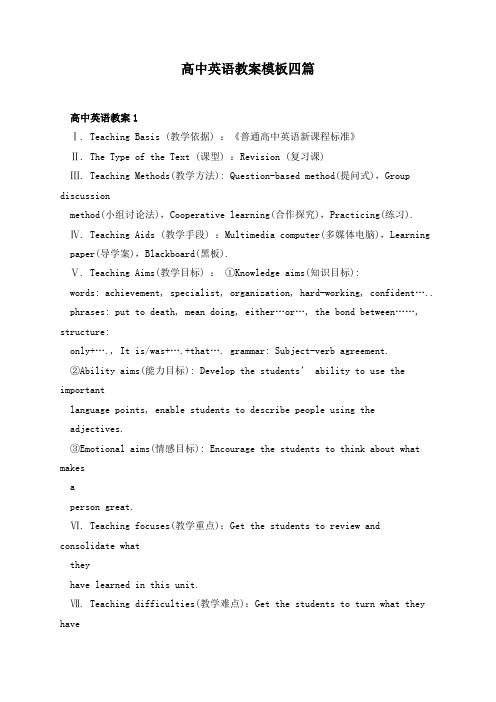
高中英语教案模板四篇高中英语教案1Ⅰ. Teaching Basis (教学依据) :《普通高中英语新课程标准》Ⅱ. The Type of the Text (课型) :Revision (复习课)Ⅲ. Teaching Methods(教学方法): Question-based method(提问式),Group discussionmethod(小组讨论法),Cooperative learning(合作探究),Practicing(练习). Ⅳ. Teaching Aids (教学手段) :Multimedia computer(多媒体电脑),Learning paper(导学案),Blackboard(黑板).Ⅴ. Teaching Aims(教学目标) :①Knowledge aims(知识目标):words: achievement, specialist, organization, hard-working, confident….. phrases: put to death, mean doing, ei ther…or…, the bond between……, structure:only+…., It is/was+….+that…. grammar: Subject-verb agreement.②Ability aims(能力目标): Develop the students’ ability to use the importantlanguage points, enable students to describe people using theadjectives.③Emotional aims(情感目标): Encourage the students to think about what makesaperson great.Ⅵ. Teaching focuses(教学重点):Get the students to review and consolidate whattheyhave learned in this unit.Ⅶ. Teaching difficulties(教学难点):Get the students to turn what they havelearned intotheir ability.Ⅷ.Teaching procedure(教学过程): Step 1 复习学案情况反馈(1分钟)Step 2 lead-in :通过图片展示的方式,过渡到知识竞答类节目《一站到底》,本节课也将模仿这种模式授课。
高中英语教案万能(精品6篇)
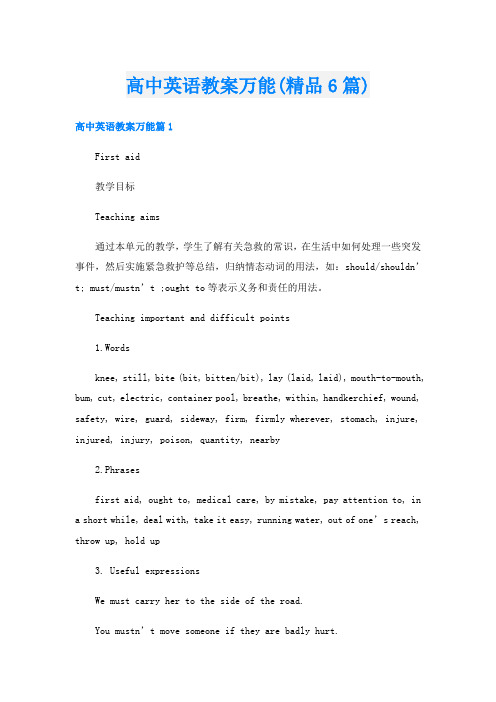
高中英语教案万能(精品6篇)高中英语教案万能篇1First aid教学目标Teaching aims通过本单元的教学,学生了解有关急救的常识,在生活中如何处理一些突发事件,然后实施紧急救护等总结,归纳情态动词的用法,如:should/shouldn’t; must/mustn’t ;ought to等表示义务和责任的用法。
Teaching important and difficult points1.Wordsknee, still, bite (bit, bitten/bit), lay (laid, laid), mouth-to-mouth, bum, cut, electric, container pool, breathe, within, handkerchief, wound, safety, wire, guard, sideway, firm, firmly wherever, stomach, injure, injured, injury, poison, quantity, nearby2.Phrasesfirst aid, ought to, medical care, by mistake, pay attention to, in a short while, deal with, take it easy, running water, out of one’s reach, throw up, hold up3. Useful expressionsWe must carry her to the side of the road.You mustn’t move someone if they are badly hurt.Parents should know some first aid.You shouldn’t get up if you are badly hurt.I ought to go home.I have to cook supper for my grandmother.4. GrammarRevise Modal Verbs : must, shouldStudy Modal Verb: ought to教学建议课文建议教师安排中国学习联盟声朗读课文,理解课文含义,通过阅读,教师对学生可小组讨论,提问,口语练习,复述急救方法等,教师给学生展示几组图片,帮助学生学会一般的急救措施和家庭安全常识。
高中英语优秀教案范例四篇

高中英语优秀教案范例四篇英语文化教学是现代教学中非常重要的一门课程,已经成为一种主流的课程,各个阶段对英语文化教育的课程都是非常重视的, 理解英语母体本身的真正含义,真正的将英语这门语言学好,达到综合运用的能力。
高中英语教案1I.MeetingyournewSs- Getting to know your Ss introducing yourself to the Ss- Setting up necessary rules for classroom learning and for homeworkII.Topics- Friends and friendship- Interpersonal relationshipsIII.Function- AgreementI agree. Yes, I think so. So do I. Me too. Exactly.No problem. Sure.Certainly. Of course. All right.You’re right/correct. Good idea.I think that’s a good idea.- DisagreementI don’t think so. Neither do I. That’s not right.Yes, but …I’m afraid not. No way.I’m sorry, but I don’t agree.Of course not. I disagree.IV.Grammar- Direct Speech and Indirect Speech (Part I. Statements and questions)1. Reporting statements“I don’t want to set down a series of facts in a diary,” said Anne.---- Anne said that she didn’t want to set down a series of facts in a diary.2. Reporting yes-no questions“Does a friend always have to be a person?” the writer asks us.---- The writer asks us if a friend always has to be a person.3. Reporting wh- questions“What do you call your diary?” Anne’s sister asked her.---- Anne’s sister asked her what she called her diary.V.Wordsandexpressionsupset ignore calm concern loose Netherlands German series outdoors dusk thunder entire entirely power curtain dusty partner settle suffer highway recover pack suitcase overcoat teenager exactly disagree grateful dislike tip swap item (32 words) add up calm down have got to be concerned aboutwalk the dog go through set down a series ofon purpose in order to at dusk face to faceno longer suffer fromget/be tired ofpack sth. upget along with fall in love join in(19 phrases)- survey vet Amsterdam Jewish Nazi Kitty spellbind loneliness Margot gossip secondly (11 words)VI.Timeallotment1st period – Warming up (P1) Workbook Listening (P41)2nd period –Pre-reading Reading Comprehension (P2-P3)3rd 4th period –Learning about Language (P4-5)5th period –Using Language (P6 Reading listening)6th period–Using Language (P7 Reading Writing)7th period–Wb Listening Task Reading Task (P43-44)8th period–Writing Task Project (P46-47)The 1st period – Warming up Using languageGoals for the 1st period:1. Introduce yourself and set up some rules for learning2. Talk about friends and friendship3. Learn the new words and expressions:upset ignore calm concern loose add up calm down have got to be concerned about walk the dogTeaching procedures:Step1Beginning1. Introduce yourself2. Set up some rules for learning:Before class: 1) Get into the classroom at the first bell.2) Get everything and yourself ready for the class.In class: 1) Follow the teacher closely and work with your mind.2) Take an active part in classroom learning activities.3) Take notes and raise questions.4) Speak English as much as you can.After class: 1) Finish your homework on time and hand it in as required.2) Review what you’ve learned in class in time.3) Preview your lesson as required.Step2Warmingup1. Introduce the topic Friendship. Ask Ss if they have a very good friend and why he or she can be their good friends.(Collect the adjectives/nouns Ss use to describe their friends on the Bb.)Supplements:Poem 1 Friends Poem 2 Auld Lang SyneBy Jill EgglestonBy Robert BurnsFriends care Should auld acquaintance be forgotFriends share and never brought to mind?We need friends Should auld acquaintance be forgotEverywhere!and days of auld lang syne?For auld lang syne, my dear,Proverbs: for auld lang syne,A life without a friend is a life withoutwe’ll take a cup of kindness yes,a sun. --- French proverbfor auld lang syne.You can buy friendship with friendship,but never with dollars.Should auld acquaintance be forgot --- Unknown and never brought to mind?A friend is a person with whom I may be Should auld acquaintance be forgotsincere. With him, I may think aloud. and days of auld lang syne?--- Ralph Waldo Emerson And here’s a hand, my trusty friendReal friendship is shown in times of trouble; And gie’s (give us) a hand o’thineProsperity is full of friends. We’ll tak’ a cup o’kindness yet---EuripidesFor auld lang syne.2. Think: What qualities and behaviors make a good friend?(a. Let the Ss make a list of 3-5 qualities a good friend should have.b. Have them work in group of four to collect the list of words.c. Then ask one from each group to write the words on the Bb.)3. Have the Ss do the survey in the Sb P1.4. When they have completed it, have Ss look again at the list on the Bb to see whether it should be revised.Explanation of each item:Q1: A: 1 point B. 3 points C. 2 pointsThis question deals with how thoughtful you are towards others: How much do you value your friend? Would you change the time of the day to go to the cinema to fit in with him/her?Q2: A: 1 point B. 2 points C. 3 pointsThis question is concerned with fairness: Is it fair for your friend to borrow something, break it and return it broken?Q3: A: 1 point B. 2 points C. 3 pointsThis question deals with your concern for others: Should you make the troubles of your friend more important than your own responsibilities?Q4: A: 3 point B. 2 points C. 1 pointsThis question is concerned with responsibilities to a friend. If you are asked to look after something and it is broken or harmed, what should you do?Q5: A: 0 point B. 2 points C. 0 pointsThis question is concerned with honesty.5. Quickly deal with the meaning of the new expressions in this part. We’ll later practice them in Ex 1, 2, 3 in Learning about language on Sb P.41) add up: v. to add sth. together2) upset: adj. sad, unhappy3) ignore: v. pay no attention to4) calm…down: v. make sb. calm, comfort sb.5) have got to …: v. have to do sth.6) be concerned about: v. be worried about, care about7) walk the dog: v. exercise the dog8) loose: adj. not tight重点词汇用法的学习,例如:1. add: add ... to;add to; add up; add up to;Eg. Will you please add some milk to my coffee?The little baby adds to our enjoyment at the party.Add up your score and see how many points you get.Add up these figures foe me, please.All the money I have in my pocket adds up to $ 125.2. upset: adj. worried, annoyed; v. cause to worry, to be sad/angryEg. I was very upset because one of my friends was rude to me.His cheating in the exam upset his teacher.3. ignore: v. pay no attention to; to behave as if you had not heard or seen sb./sth. n. ignoranceEg. You can’t ignore the fact that many criminals never go to prison.These are the problems which we can’t afford to ignore.Sam rudely ignored the inquiry.He had completely ignored her remark, preferring his own theory.4. calm: v. calm downEg. The mother calmed the baby by giving him some milk.What the manager said calmed the fears of the works.We tried to calm him down, but he kept shouting and crying.Calm down. There’s nothing to worry about.5. concern: v. concern sth.; be concerned about /with/ for sb. / sth.; n.Eg. This case concerns the group of people greatly.What I said at the meeting doesn’t concern you, so don’t worry about it.Our head teacher is concerned about our study and health all the time.He has never been concerned about/for what others think of him.He seemed to be concerned with the case.Your school work, rather than your private life, is my concern.My greatest concern is the development of our school.6. walk the dog: to take a dog for a walkEg. He is out walking the dog.walk sb home/ to a placeIt’s late --- let me walk you to the bus stop.6. If necessary, the T may ask one or two Ss the following questions:a. What kind of person are you according to the survey?b. Do you think you can be a good friend to others? And how?c. What do you think are the basic elements we need to keep our friendship?Step3ListeningWorkbook Listening on P411. Before you listen, discuss these questions with the class.1) Do you think it is a good idea to make friends with people from other countries?(to broaden one’s world outlook; to avoid national stereotypes etc.)2) What are the advantages of this friendship?(to practice another language with a native speaker; to learn new ideas and new ways of thinking; to find out more about another country etc.)2. the 1st Listening of Part 1: Write down what Leslie does in China in one sentence.(Leslie does some business in China and her company sells buses.)3. the 2nd Listening of Part 1: Tick the things done by Leslie.(going out for delicious dinners; visiting a mountain; going to people’s homes)4. the 1st Listening of Part 2: What does Leslie say about the friends she made in China?(1) Leslie says that she make friends but they are just business friends because she thinks one cannot make friends on a short visit.(2) Leslie thinks some of the friends in China may have liked her, but others may try to be nice to her so as to gain a business advantage.Step4Homework1. Make sentences with the 8 new words and expressions.2. Prepare and read aloud the rest new words.The 2nd period – Pre-reading Reading ComprehensionGoals for the 2nd period:1. Have Ss read the text and try their best to understand Anne’s eagerness for friends, friendship, nature and freedom.2. Get Ss have some knowledge about the Nazi’s cruel deeds towards the Jews during the Second World War.3. Train Ss’ reading ability of scanning and skimming. Learn to appreciate Anne’s Diary , the classic work.高中英语教案2课题:Friendship\(2)教材分析与学生分析:本单元的中心话题是“友谊”,几乎所有的内容都是围绕这一中心话题展开的。
高中英语教学设计模板5篇
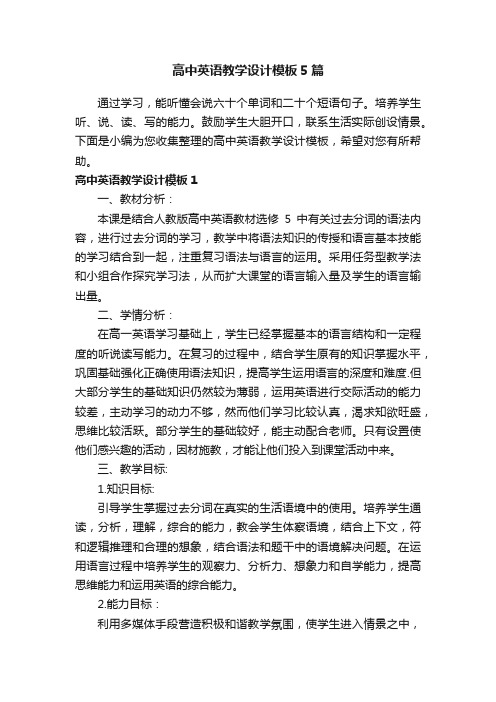
高中英语教学设计模板5篇通过学习,能听懂会说六十个单词和二十个短语句子。
培养学生听、说、读、写的能力。
鼓励学生大胆开口,联系生活实际创设情景。
下面是小编为您收集整理的高中英语教学设计模板,希望对您有所帮助。
高中英语教学设计模板1一、教材分析:本课是结合人教版高中英语教材选修5中有关过去分词的语法内容,进行过去分词的学习,教学中将语法知识的传授和语言基本技能的学习结合到一起,注重复习语法与语言的运用。
采用任务型教学法和小组合作探究学习法,从而扩大课堂的语言输入量及学生的语言输出量。
二、学情分析:在高一英语学习基础上,学生已经掌握基本的语言结构和一定程度的听说读写能力。
在复习的过程中,结合学生原有的知识掌握水平,巩固基础强化正确使用语法知识,提高学生运用语言的深度和难度.但大部分学生的基础知识仍然较为薄弱,运用英语进行交际活动的能力较差,主动学习的动力不够,然而他们学习比较认真,渴求知欲旺盛,思维比较活跃。
部分学生的基础较好,能主动配合老师。
只有设置使他们感兴趣的活动,因材施教,才能让他们投入到课堂活动中来。
三、教学目标:1.知识目标:引导学生掌握过去分词在真实的生活语境中的使用。
培养学生通读,分析,理解,综合的能力,教会学生体察语境,结合上下文,符和逻辑推理和合理的想象,结合语法和题干中的语境解决问题。
在运用语言过程中培养学生的观察力、分析力、想象力和自学能力,提高思维能力和运用英语的综合能力。
2.能力目标:利用多媒体手段营造积极和谐教学氛围,使学生进入情景之中,充分调动学生的思维活动和情感体验,规范学生运用英语知识准确表达的能力,同时,发展学生综合语言运用的能力,分析问题和解决问题的能力,培养学生自主学习。
3.德育目标:用含过去分词的句子结构表达思想感情。
四、教学重点:1.过去分词的用法.2. 过去分词的运用五、教学难点:1.结合语法知识,以课堂教学为依托,全面训练学生的听、说、读、写能力,加强和提高运用英语的综合能力。
高中英语优秀教学案例六篇
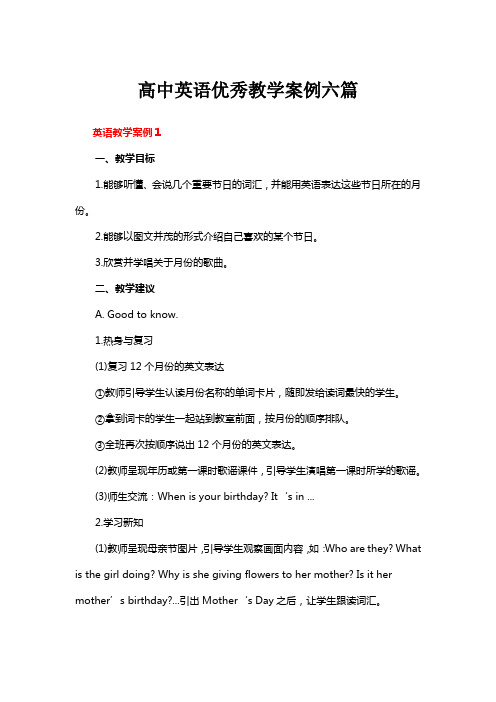
高中英语优秀教学案例六篇英语教学案例1一、教学目标1.能够听懂、会说几个重要节日的词汇,并能用英语表达这些节日所在的月份。
2.能够以图文并茂的形式介绍自己喜欢的某个节日。
3.欣赏并学唱关于月份的歌曲。
二、教学建议A. Good to know.1.热身与复习(1)复习12个月份的英文表达①教师引导学生认读月份名称的单词卡片,随即发给读词最快的学生。
②拿到词卡的学生一起站到教室前面,按月份的顺序排队。
③全班再次按顺序说出12个月份的英文表达。
(2)教师呈现年历或第一课时歌谣课件,引导学生演唱第一课时所学的歌谣。
(3)师生交流:When is your birthday? It‘s in ...2.学习新知(1)教师呈现母亲节图片,引导学生观察画面内容,如:Who are they? What is the girl doing? Why is she giving flowers to her mother? Is it her mother’s birthday?...引出Mother‘s Day之后,让学生跟读词汇。
英语教学案例2一、语言技能目标第一层次:1.能够听懂、会说衣服词汇cap,coat,shoes,sweater,jacket,gloves,trousers;能在四线三格中基本规范地抄写单词,并尝试借助拼读规律记忆单词。
2.能够听懂、会说用来介绍复数衣服的功能句:These are ...3.能够听懂、会说用来询问自己该穿什么衣服的功能句:What should I wear today?及其答语:You should wear ...,初步学会在恰当的情境中运用,并通过描摹句子来体会句子书写规范,为抄写句子和独立写句子打基础。
4.能够读懂介绍自己所在城市的季节、天气、穿衣情况以及询问对方城市相关情况的小书信;并通过替换小书信中的关键信息回信,介绍自己的上述情况,回复朋友的询问。
5.能够借助熟悉的旧单词和图片感知字母u在闭音节单词中的发音规律,并利用该规律拼出新单词的读音,进而尝试记住其写法。
高中教案详案范文英语精选10篇
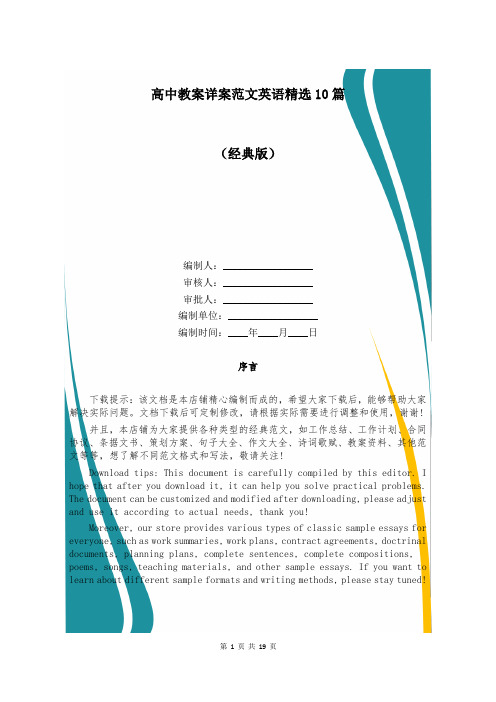
高中教案详案范文英语精选10篇(经典版)编制人:__________________审核人:__________________审批人:__________________编制单位:__________________编制时间:____年____月____日序言下载提示:该文档是本店铺精心编制而成的,希望大家下载后,能够帮助大家解决实际问题。
文档下载后可定制修改,请根据实际需要进行调整和使用,谢谢!并且,本店铺为大家提供各种类型的经典范文,如工作总结、工作计划、合同协议、条据文书、策划方案、句子大全、作文大全、诗词歌赋、教案资料、其他范文等等,想了解不同范文格式和写法,敬请关注!Download tips: This document is carefully compiled by this editor. I hope that after you download it, it can help you solve practical problems. The document can be customized and modified after downloading, please adjust and use it according to actual needs, thank you!Moreover, our store provides various types of classic sample essays for everyone, such as work summaries, work plans, contract agreements, doctrinal documents, planning plans, complete sentences, complete compositions, poems, songs, teaching materials, and other sample essays. If you want to learn about different sample formats and writing methods, please stay tuned!高中教案详案范文英语精选10篇高中教案详案范文英语第一篇I know most of my high school fantasy of XXXcontentXXX is not possible, otherwise it is not called XXXfantasyXXX.Things are always conflict with I XXXthinkXXX, might be gods his old mans house dont let me get it.High school I even very hard tsinghua Beijing university,more dont say XXXones deceased father grindXXX later; The college entrance eXamination after I went to the jiangnan tourism, looking forward to meet in a misty rain.But didnt in this picturesque jiangnan met that my mind think that XXXwomanXXX; Im looking forward to start a company also dont know whether can realize, everything is unknown...高中教案详案范文英语第二篇1.题目:MillenniumKids2.内容Millennium Kids is an international youth empowerment environmental organization.Millennium Kids HQ - Perth Western Australia is a not-for-profit organization headquartered in Perth, Western Australia,began in 1996 after a small group of Western Australian students attended the United Nations ‘Leave It ToUs’ environmental conference for children in the UK.On their return from the conference, the young people were disappointed with the level of youth involvement in local environment issues and decided to set the wheels in motion for developing their own environmental conference –“Kids Helping Kids.With support from Perth Zoo, Department of Environment, Clean Up Australia, CALM and the City of South Perth a conference was born and, subsequently, their own youth-based environmental organization, Millennium Kids Inc.The organization has international affiliates in Canada and South Africa with collaborative organization links in Indonesia and Malaysia.Millennium Kids Australia is a registered charity with taX deductible lennium Kids is run by kids, for kids,aged 10–25 years.A team of educators, mentors and sponsors support their aim to encourage young people to be leaders by being aware and active in their environment.Young people aged 18–25 can progress to leadership and training roles within the organization helping take practical action to improve their local environment.The Millennium Kids agenda is directed by its Youth Board,with fifteen members aged between 10 and 25 years, and issupported by the United Nations Environment Program Agenda 21,Chapter 25 Declaration which states ‘national governments should pay more attention to the opinions and concerns of children regarding the environment’ and how it should be managed for future generations’.3.要求(1)朗读短文(2)设计听力课(3)适当板书设计高中教案详案范文英语第三篇高中英语阅读课文具有题材广泛、体裁各样、语言知识丰富等特征,是各单元教学的核心部分,也是培养学生阅读能力的主要渠道。
- 1、下载文档前请自行甄别文档内容的完整性,平台不提供额外的编辑、内容补充、找答案等附加服务。
- 2、"仅部分预览"的文档,不可在线预览部分如存在完整性等问题,可反馈申请退款(可完整预览的文档不适用该条件!)。
- 3、如文档侵犯您的权益,请联系客服反馈,我们会尽快为您处理(人工客服工作时间:9:00-18:30)。
高中英语教案万能模板学习习惯属于非智力的范畴,但它对学生学习却起到事半功倍的效果。
故此,英语教师应从早读入手,培养学生的朗读能力;强化英语书写规范的训练,为高考书面表达的书写打下良好的基础。
高中英语教案1文件high1 unit18.doc标题 Unit 18 The necklace章节第十八单元关键词内容单元重点Ⅰ.语言要点accept, invitation, after all, continue, call on, day and night, pay back, at the most,worth, not…any moreⅡ.日常交际用语1. Where have you been all these days?2. What happened?3. We did have a good time.4. Excuse me. I’ve lost a case I wonder if it’s been found.5. Can you describe the case?6. Where did you last have it?7. We aske d everyone there if they had found …, but without luck.8. We couldn’t find it; it was lost.Ⅲ.语法疑问句的直接引语和间接引语e.g.1. He asked if she was Pleased.2. She asked him how many People were going to the ball.背景知识介绍1.Guy de Maupassant(莫泊桑1850—1893)was a well—known French novelist and short –story writer.在少年时他就对文学表现出了浓厚的兴趣,很小的时候开始写作,在30多岁成为著明的小说家,他的大部分作品讲的是人们的日常生活。
1871年开始,他在政府部门就职,这期间他熟悉了政府职员的生活。
这段经历帮助他创造出了他的短篇小说“项链”。
他的作品简洁明了,讽刺运用得恰到好处。
莫泊桑晚年承受疾病围绕,1893年病逝于巴黎。
2.有关这部戏的介绍“项链”这篇课文是一个独幕剧,它包括三个人物:Mathilde Loisel, a yang woman;Pierre Loisel, Mathilde’s husband, a government worker; Jeanne, Mathilde’s good friend.课文难点分析1. Scene1 A park in Paris ……walks towards her.这部分用斜体表示,或象下文一样置于括号中,叫做舞台指导说明(stage directions )一般使用现在时态。
戏剧一般首先介绍故事发生的时间(time)、地点(place)和剧中人物(characters)。
在这一段中有了具体介绍。
2. …but I don’t think I know you. 我好象并不认识你。
I don’t think I should do that. 我认为我不该做那件事。
I don’t believe she will e. 我上信她不会来。
“think, believe” 这两个词的否定式在主句中表示,而宾语从句中的动词用肯定式。
3. In fact you do. 事实上你认识我。
=In fact, you know me. 为了避免和前面重复,所以用助动词代替。
e.g.①We all love singing, but he doesn’t. 我们都喜欢唱歌,但他不喜欢。
②Class 2 went to a picnic, but Class 1 didn’t. 2班去野餐了,但1班没去。
4. recognize vt. 认识,辨认e.g.①She was so changed that I hardly recognized her. 她变得我几乎认不出来了。
②Harry recognized me in the crowd. 亨利在人群中认出了我。
5. Where have you been all these years? 这些年你上哪儿去了?e.g. The teacher asked Jane, “You didn’t e to school, last week, where have you been?”老师问Jane,“你上星期没来学校,去哪儿了?”6. That’s because of hard work. 那是因为劳累。
e.g.①He couldn’t go further. That’s becau se of his wounded leg.他不能再往前走了,因为他的腿受了伤。
②He cried because of the pain in his arm = He cried because he had a pain in his arm.他因为胳膊疼而哭了。
because of后面跟名词在句中作状语与because加句子引导的状语从句意义相同。
7. Have times been hard for you? 这些年境况不太好吧!times这个词我们以前见过:(morden times )表示目前或某种特殊时期的生活情况或环境,可译作“日子”、“境况”、“时代”。
e.g.①He didn’t plain of hard times, but kept on working hard. 他没有抱怨时势艰难,相反的是一直努力工作。
②Students thought times are terrible in July. 学生们认为7月是一段难熬的日子。
8. But what happened? 发生什么事了?happen take place. 没有被动式。
e.g.①I reme mbered the whole things as if it happened yesterday.我记得整个事情,就好象是昨天发生的。
②──Why didn’t the boss e yesterday? 为什么老板昨天没来?──An accident happened to him. 他出事了。
9. Do you remember one afternoon ten years ago when I came to your house and borrowed anecklace of yours. 10年前的一个下午,我到你家借过一条项链,你还记得吗?Ten year ago和由when 引导的定语从句一起修饰afternoon.e.g.①Cart still remembers one afternoon in his first year when the professor took the students the Chemistry lab.卡尔仍然记得一年级时教授带学生到化学实验室去的那个下午的情景。
②There are thousands of starts in t he sky that are like our sun.天空中有成千上万颗像太阳一样的恒星。
10. I’ve written to accept the invitation. 我已经写信表示接受邀请了。
e.g.①I received a note, but didn’t accept it. 我收到了一张支票,但没接受。
②Jack received my letter, and accepted my advice.Jack收到了我的信并且接受了我的建议。
③give sb. An invitation给sb发邀请(invite sb. to…)refuse sb’s invitation. 拒绝sb的邀请。
11. I haven’t got an evening dress for the ball! 我没有参加晚会的礼服啊!12. But, just this once. After all, this ball is very important.不过就这么一次,要知道,这次舞会很重要啊!after all“毕竟,终究,到底”。
用来说服或提醒对方,引出对方似乎忘记了的某个重要的论点或理由。
e.g.①They met with difficulties, but I hear that they’re succeeded after all.他们遇到了困难,但我听说他们终究是成功了。
②She said she would not go to the ball, but she went there after all.她说不去参加舞会,但最后还是去了。
13. I have no jewellery to wear. 我没有首饰戴。
dress和wear的区别:e.g.①She always dresses in green. 她总是穿着绿色的衣服。
②Dress at once! 立刻穿上衣服。
③The mother dresses the baby everyday. 妈妈每天给小宝宝穿衣服。
而wear的宾语只能是鞋帽等物品,表示一种状态。
④He’s wearing a new coat today. 他今天穿了一件新大衣。
但不能说:Wear your clothes at once.14. Can’t you just wear a flower instead? 难道不能就戴一朵花吗?这是一个否定疑问句,表示吃惊,可能含有批评或责备的意思。
e.g.①Hasn’t Albert telephoned you? Albert还没有打电话来吗?(说话人认为Albert本该已经打电话来了,但却没打,因此感到奇怪,并含有批评的口气)②It’s getting dark. Can’t you walk a little faster? 天快黑了,你不能走快点吗?(说话人觉得对方走慢了,含有责备的口气)15. She married a man with a lot of money. 她嫁了一个很有钱的人。
marry sb. 娶了某人/嫁给某人。
get married结了婚。
be/ get married to sb.与某人结婚,不能用 with.e.g.①—Is Jack married? Jack结婚了吗?—He got married last year. 他去年结婚了。
